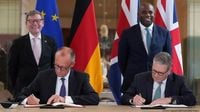On July 17, 2025, British Prime Minister Keir Starmer and German Chancellor Friedrich Merz signed a landmark treaty in London, marking a significant milestone in post-Brexit European relations. The agreement, officially named the "Kensington Treaty," aims to deepen cooperation between the two nations across defense, trade, migration, and cultural exchanges, signaling a renewed commitment to European security amid growing concerns about Russia's aggression and uncertainty over U.S. support under President Donald Trump.
The treaty was signed at the Victoria and Albert Museum in London—a symbolic venue named after Queen Victoria and her German husband, Prince Albert—highlighting the historic ties between the UK and Germany. Merz, making his first official visit to Britain since taking office in May, described the day as "a historic day for German-British relations," emphasizing the overdue nature of such a pact, especially in light of the UK's 2020 departure from the European Union.
"We want to work together more closely, particularly after the United Kingdom’s withdrawal from the European Union," Merz said. "It is overdue for us to conclude such a treaty with each other." Starmer echoed this sentiment, calling the treaty "a statement of intent, a statement of our ambition to work ever more closely together." He described the agreement as a "partnership with a purpose," underscoring the urgency of confronting the challenges Europe currently faces.
The treaty builds on an earlier defense pact signed last year between the UK and Germany, which committed both countries to closer cooperation against the growing threat from Russia. A key provision includes a mutual assistance clause, promising to "assist one another, including by military means, in case of an armed attack on the other." While both nations are NATO members and already bound by the alliance’s mutual defense pact, this bilateral commitment adds a layer of reassurance amid doubts about the reliability of the U.S. under President Trump.
Merz pointed out that the treaty reflects a convergence of positions among the E3 powers—Great Britain, France, and Germany—on foreign, security, migration, and economic policies. This trilateral cooperation was further emphasized during French President Emmanuel Macron’s state visit to Britain the previous week, where France and Britain pledged to coordinate their nuclear deterrents for the first time. Germany, which does not possess nuclear weapons, agreed with Britain to maintain "a close dialogue on defense issues of mutual interest, including on nuclear issues," reinforcing a shared commitment to the security of the Euro-Atlantic area.
Both Germany and the UK have pledged to raise defense spending to 3.5% of GDP in the coming years, responding to calls from NATO members and reflecting the urgency of bolstering European defense capabilities. The treaty also includes plans to jointly produce defense exports such as the Boxer armored vehicle and Typhoon Eurofighter jets, and to develop a deep precision strike missile within the next decade. Notably, German defense startup Stark, known for manufacturing drones used by Ukraine, will open a factory in England, further solidifying industrial and technological ties.
Ukraine’s defense needs were a key topic during the signing. Merz and Starmer discussed ways to enhance European support for Kyiv, following President Trump’s announcement of plans to sell American weapons to NATO allies, who would then transfer arms to Ukraine. Merz cautioned that it might take "days, perhaps weeks" before weapons reach Ukraine, emphasizing the need for clarity on how U.S. weapon systems given up by European countries will be replaced.
Beyond defense, the treaty addresses migration challenges, a critical concern for both nations. The UK has faced a surge in illegal crossings via the English Channel, with 37,000 people making the perilous journey in small boats in 2024 and over 22,000 so far in 2025. Starmer praised Merz’s commitment to curbing smuggling gangs, with Germany agreeing to criminalize the facilitation of migrant smuggling to the UK by the end of 2025. This legal change will empower law enforcement to investigate the supply and storage of small boats used in these dangerous crossings, aiming to dismantle criminal networks responsible for human trafficking.
The treaty establishes an annual "Home Affairs dialogue at senior official level" to address migrant smuggling and border security, and commits both countries to mutual legal assistance and prosecution of offenders involved in smuggling operations. This cooperation extends to trilateral engagement with France and multilateral forums such as the G7 and United Nations, reflecting a comprehensive approach to international challenges.
On the cultural front, the treaty eases visa restrictions to facilitate student exchange trips between the UK and Germany. Merz expressed satisfaction with the agreement, noting it would allow young people from both countries to "get to know both countries better," fostering closer people-to-people ties despite the political complexities of Brexit. The treaty also includes plans to boost connectivity by establishing a new direct rail link, enhancing economic ties and travel convenience between the two nations.
Starmer’s efforts to repair and strengthen relations with European neighbors have been a hallmark of his premiership, seeking to move past the acrimony of Brexit without rejoining the EU’s single market or customs union. This treaty represents a pragmatic step towards cooperation on shared priorities, balancing sovereignty with the need for collaboration on security, trade, and migration.
Europe faces a precarious geopolitical landscape, with Russia’s ongoing war in Ukraine and questions about the steadfastness of the U.S. as an ally. The Kensington Treaty between the UK and Germany, together with recent Franco-British agreements, underscores a growing European resolve to act collectively. As Merz put it, "The United Kingdom and Germany side by side" are determined to "shape this new era with new leadership opportunities."
The treaty’s 30 articles outline a practical work plan encompassing 17 major projects, from defense cooperation and economic growth initiatives to migration control and youth mobility. It marks a historic step forward in German-British relations, nearly 80 years after the end of World War II, and nearly a decade after Britain’s vote to leave the European Union.
In a world of shifting alliances and emerging threats, this agreement signals that Britain and Germany are not only acknowledging their intertwined past but actively forging a future of shared security and prosperity.





